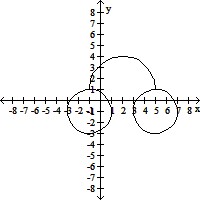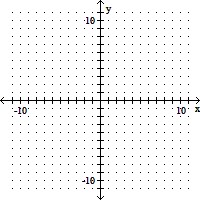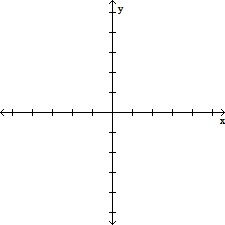Divide.0.18 ÷ 0.003
A. 60
B. 0.06
C. 0.6
D. 6
Answer: A
You might also like to view...
Set the viewing rectangle of your graphing calculator to  by
by  to solve the problem.Find a set of parametric equations evaluated over 0 ? t ? 2? that produces the graph shown.
to solve the problem.Find a set of parametric equations evaluated over 0 ? t ? 2? that produces the graph shown.
A.
| x1 = -1 + 2cos(t), | y1 = -1 + 2sin(t) |
| x2 = 3 + 2cos(t), | y2 = -1 + 2sin(t) |
| x3 = 1 + 3cos(0.5t), | y3 = 1 + 3sin(0.5t) |
B.
| x1 = -1 + 2cos(t), | y1 = -1 + 2sin(t) |
| x2 = 5 + 2cos(t), | y2 = -1 + 2sin(t) |
| x3 = 2 + 3cos(t), | y3 = 1 + 3sin(t) |
C.
| x1 = -1 + 2cos(t), | y1 = -1 + 2sin(t) |
| x2 = 5 + 2cos(t), | y2 = -1 + 2sin(t) |
| x3 = 2 + 2cos(0.5t), | y3 = 1 + 2sin(0.5t) |
D.
| x1 = -1 + 2cos(t), | y1 = -1 + 2sin(t) |
| x2 = 5 + 2cos(t), | y2 = -1 + 2sin(t) |
| x3 = 2 + 3cos(0.5t), | y3 = 1 + 3sin(0.5t) |
Use graphical methods to solve the linear programming problem.Minimize z = 4x + 5y subject to: 2x - 4y ? 10 2x + y ? 15 x ? 0 y ? 0
A. Minimum of 20 when x = 5 and y = 0 B. Minimum of 75 when x = 0 and y = 15 C. Minimum of 39 when x = 1 and y = 7 D. Minimum of 33 when x = 7 and y = 1
Draw a graph to match the description. Answers will vary.f(x) has a negative derivative over (-?, -4) and a positive derivative over (-4, ?). 
What will be an ideal response?
Factor the polynomial.x2 - x - 30
A. (x + 6)(x - 5) B. (x + 1)(x - 30) C. (x + 5)(x - 6) D. prime